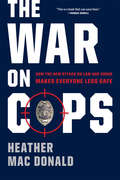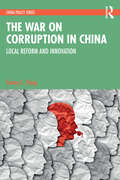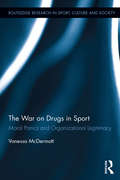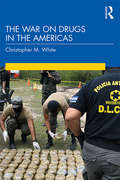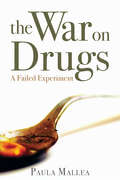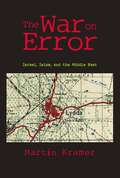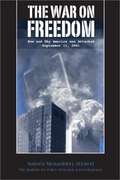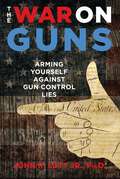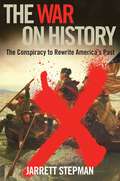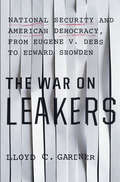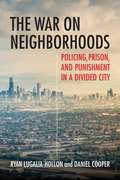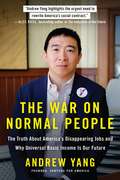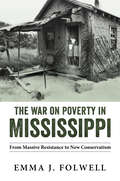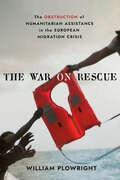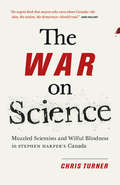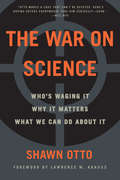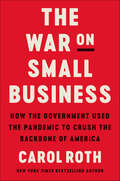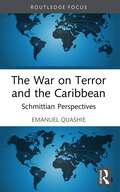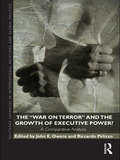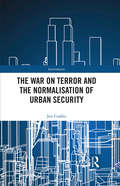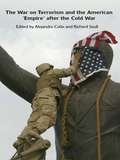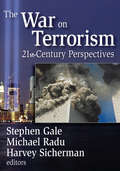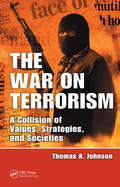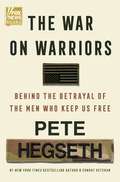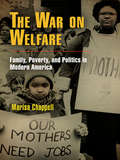- Table View
- List View
The War on Cops: How the New Attack on Law and Order Makes Everyone Less Safe
by Heather Mac Donald<P>Violent crime has been rising sharply in many American cities after two decades of decline. Homicides jumped nearly 17 percent in 2015 in the largest 50 cities, the biggest one-year increase since 1993. <P>The reason is what Heather Mac Donald first identified nationally as the "Ferguson effect": Since the 2014 police shooting death of Michael Brown in Ferguson, Missouri, officers have been backing off of proactive policing, and criminals are becoming emboldened. This book expands on Mac Donald's groundbreaking and controversial reporting on the Ferguson effect and the criminal-justice system. It deconstructs the central narrative of the Black Lives Matter movement: that racist cops are the greatest threat to young black males. On the contrary, it is criminals and gangbangers who are responsible for the high black homicide death rate. <P>The War on Cops exposes the truth about officer use of force and explodes the conceit of "mass incarceration." A rigorous analysis of data shows that crime, not race, drives police actions and prison rates. The growth of proactive policing in the 1990s, along with lengthened sentences for violent crime, saved thousands of minority lives. In fact, Mac Donald argues, no government agency is more dedicated to the proposition that "black lives matter" than today's data-driven, accountable police department. <P>Mac Donald gives voice to the many residents of high-crime neighborhoods who want proactive policing. She warns that race-based attacks on the criminal-justice system, from the White House on down, are eroding the authority of law and putting lives at risk. This book is a call for a more honest and informed debate about policing, crime, and race. <P><b>A New York Times Bestseller</b>
The War on Corruption in China: Local Reform and Innovation (China Policy Series)
by Sunny L. YangHaving engaged in an intensified war against corruption for more than four decades since the period of reform and opening up, China is now at a turning point in its anti-corruption agenda. Many believe that building government integrity has been a top-down process in China, and the anti-corruption strategies taken by the current administration seem to have confirmed it. This book challenges the view by analyzing local anti-corruption innovations in recent years and argues for the importance of bottom-up efforts in controlling corruption. The book attempts to answer the question of whether the rise of local anti-corruption innovations has helped China to pursue anti-corruption reform more effectively and, if so, why. It proceeds to analyze the major patterns of local anti-corruption innovations, the ways in which they have been initiated and implemented, and the factors influencing their success or failure. The book includes more than 400 cases of local innovative anti-corruption reforms in China in recent years. This book will be a useful reference for those interested in learning more about anti-corruption studies and also contributes to the study of corruption and anti-corruption reform in China by providing solid and fresh evidence of anti-corruption innovation by local governments.
The War on Drugs in Sport: Moral Panics and Organizational Legitimacy (Routledge Research in Sport, Culture and Society)
by Vanessa McDermottThis book is an innovative and compelling work that develops a modified moral panic model illustrated by the drugs in sport debate. Drawing on Max Weber’s work on moral authority and legitimacy, McDermott argues that doping scandals create a crisis of legitimacy for sport governing bodies and other elite groups. This crisis leads to a moral panic, where the issue at stake for elite groups is perceptions of their organizational legitimacy. The book highlights the role of the media as a site where claims to legitimacy are made, and contested, contributing to the social construction of a moral panic. The book explores the way regulatory responses, in this case anti-doping policies in sport, reflect the interests of elite groups and the impact of those responses on individuals, or "folk devils." The War on Drugs in Sport makes a key contribution to moral panic theory by adapting Goode and Ben-Yehuda’s moral panic model to capture the diversity of interests and complex relationships between elite groups. The difference between this book and others in the field is its application of a new theoretical perspective, supported by well-researched empirical evidence.
The War on Drugs in the Americas
by Christopher M. WhiteThe War on Drugs in the Americas brings together the history of the War on Drugs in the US and Latin America to reveal how, since 1914, when the US first criminalized the non-medical use of narcotics, the trade and violence associated with drugs has developed throughout the hemisphere. This concise and accessible book provides an overview of the geographic, historical, economic, and social dimensions of the War on Drugs throughout the past century. Notable figures, popular drugs, competing theories, and significant historical events take center stage, as the story moves between macro analysis and micro details. Aside from infamous cartel leaders like Colombia’s Pablo Escobar and Mexico’s El Chapo Guzman, the reader learns about equally important but lesser-known Latin American and US traffickers. In addition to counter-narcotics giants, readers learn about Law Enforcement Against Prohibition (LEAP), DEA agents working to fight pharmaceutical companies and distributors, cutting-edge researchers and politicians that have pushed for and against the war. The War on Drugs in the Americas is essential reading for students studying Latin American History, International Studies, and Politics through its clear and objective narrative of the origins, impact, and debates behind the War on Drugs in the US and Latin America.
The War on Drugs: A Failed Experiment
by Paula MalleaA criminal prosecutor discusses the illegal drug trade and the failure of the so-called “War on Drugs” to stop it. In 1971, President Richard Nixon coined the term “War on Drugs.” His campaign to eradicate illegal drug use was picked up by the media and championed by succeeding presidents, including Reagan. Canada was a willing ally in this “war,” and is currently cracking down on drug offences at a time when even the U.S. is beginning to climb down from its reliance on incarceration. Elsewhere in the world, there has been a sea change. The Global Commission on Drug Policy, including international luminaries like Kofi Annan, declared that the War on Drugs “has not, and cannot, be won.” Former heads of state and drug warriors have come out in favour of this perspective. Former presidents Jimmy Carter and Bill Clinton agree with legions of public health officials, scientists, politicians, and police officers that a new approach is essential. Paula Mallea, in The War on Drugs, approaches this issue from a variety of points of view, offering insight into the history of drug use and abuse in the twentieth century; the pharmacology of illegal drugs; the economy of the illegal drug trade; and the complete lack of success that the war on drugs has had on drug cartels and the drug supply. She also looks ahead and discusses what can and is being done in Canada, the U.S., and the rest of the world to move on from the “war” and find better ways to address the issue of illegal drugs and their distribution, use, and abuse.
The War on Error: Israel, Islam and the Middle East
by Martin KramerIn 'The War on Error', historian and political analyst Martin Kramer presents a series of case studies, some based on pathfinding research and others on provocative analysis, that correct misinformation clouding the public's understanding of the Middle East. He also offers a forensic exploration of how misinformation arises and becomes "fact." The book is divided into five themes: Orientalism and Middle Eastern studies, a prime casualty of the culture wars; Islamism, massively misrepresented by apologists; Arab politics, a generator of disappointing surprises; Israeli history, manipulated by reckless revisionists; and American Jews and Israel, the subject of irrational fantasies. Kramer shows how error permeates the debate over each of these themes, creating distorted images that cause policy failures. Kramer approaches questions in the spirit of a relentless fact-checker. Did Israeli troops massacre Palestinian Arabs in Lydda in July 1948? Was the bestseller 'Exodus' hatched by an advertising executive? Did Martin Luther King, Jr., describe anti-Zionism as antisemitism? Did a major post-9/11 documentary film deliberately distort the history of Islam? Did Israel push the United States into the Iraq War? Kramer also questions paradigms—the "Arab Spring," the map of the Middle East, and linkage. Along the way, he amasses new evidence, exposes carelessness, and provides definitive answers.
The War on Freedom: How and Why America was Attacked, September 11, 2001
by Nafeez Mosaddeq AhmedA disturbing exposé of the American government's hidden agenda, before and after the Sept.11, 2001 terrorist attacks. A wide range of documents show U.S. officials knew in advance of the "Boeing bombing" plot, yet did nothing. Did the attacks fit in with plans for a more aggressive U.S. foreign policy? Nafeez Ahmed examines the evidence, direct and circumstantial, and lays it before the public in chilling detail: how FBI agents who uncovered the hijacking plot were muzzled, how CIA agents trained Al Qaeda members in terror tactics, how the Bush family profited from its business connections to the Bin Ladens, and from the Afghan war. A "must read" for anyone seeking to understand America's New War on Terror.
The War on Guns: Arming Yourself Against Gun Control Lies
by John R. Lott Jr.When it comes to the gun control debate, there are two kinds of data: data that's accurate, and data that left-wing billionaires, politicians, and media want you to believe is accurate. In The War on Guns, economist and gun rights advocate John Lott turns a skeptical eye to well-funded anti-gun studies and stories that perpetuate false statistics to frighten Americans into giving up their guns.
The War on History: The Conspiracy to Rewrite America's Past
by Jarrett StepmanThe War on Our History Confederate memorials toppled . . . Columbus statues attacked with red paint. They started with slave-owning Confederate generals, but they’re not stopping there. The vandals are only pretending to care about the character of particular American heroes. In reality, they hate what those heroes represent: the truths asserted in the Declaration of Independence and embodied in the Constitution. And they are bent on taking America down and replacing our free society with a socialist utopia. All that stands in their way is Americans’ reverence for our history of freedom. Which is why that history simply has to go. Now, Jarrett Stepman, editor at The Daily Signal and host of Right Side of History, exposes the true aims of the war on our history: The war on America: World history is full of conquests and suffering indigenous peoples. Why target Christopher Columbus? What they really want to tear down is America. The war on Thanksgiving: World history is full of colonists. Why target the Pilgrims? What they really want to tear down is American freedom and prosperity. The war on the Founding: World history is full of slavery. Why target Thomas Jefferson? What they really want to tear down are the rights endowed by our Creator. The war on the common man: World history is full of victorious generals and populist politicians. Why target Andrew Jackson? What they really want to tear down is democracy. The war on the South: World history is full of civil strife. Why target Confederate heroes like Robert E. Lee? What they really want to tear down is respect for America’s past and the reconciliation that renewed our Union. The war on patriotism: World history is full of national pride. Why target Teddy Roosevelt? What they really want to tear down is the idea of American greatness. The war on the American century: World history is full of bloody wars. What they really want to tear down is America’s defeat of totalitarianism. If America is to survive this assault, we must rally to the defense of our illustrious history. The War on History is the battle plan.
The War on Leakers
by Lloyd C. GardnerFour days before Pearl Harbor, in December 1941, someone leaked American contingency war plans to the Chicago Tribune. The small splash the story made was overwhelmed by the shock waves caused by the Japanese attack on the Pacific fleet anchored in Hawaii-but the ripples never subsided, growing quietly but steadily across the Cold War, Vietnam, the fall of Communism, and into the present.Ripped from today's headlines, Lloyd C. Gardner's latest book takes a deep dive into the previously unexamined history of national security leakers. The War on Leakers joins the growing debate over surveillance and the national security state, bringing to bear the unique perspective of one our most respected diplomatic historians. Gardner examines how national security leaks have been grappled with over nearly five decades, what the relationship of "leaking" has been to the exercise of American power during and after the Cold War, and the implications of all this for how we should think about the role of leakers and democracy.Gardner's eye-opening new history asks us to consider why America has invested so much of its resources, technology, and credibility in a system that all but cries out for loyal Americans to leak its secrets.
The War on Neighborhoods: Policing, Prison, and Punishment in a Divided City
by Ryan Lugalia-Hollon Daniel CooperA narrative-driven exploration of policing and the punishment of disadvantage in Chicago, and a new vision for repairing urban neighborhoodsFor people of color who live in segregated urban neighborhoods, surviving crime and violence is a generational reality. As violence in cities like New York and Los Angeles has fallen in recent years, in many Chicago communities, it has continued at alarming rates. Meanwhile, residents of these same communities have endured decades of some of the highest rates of arrest, incarceration, and police abuse in the nation.The War on Neighborhoods argues that these trends are connected. Crime in Chicago, as in many other US cities, has been fueled by a broken approach to public safety in disadvantaged neighborhoods. For nearly forty years, public leaders have attempted to create peace through punishment, misinvesting billions of dollars toward the suppression of crime, largely into a small subset of neighborhoods on the city's West and South Sides. Meanwhile, these neighborhoods have struggled to sustain investments into basic needs such as jobs, housing, education, and mental healthcare.When the main investment in a community is policing and incarceration, rather than human and community development, that amounts to a "war on neighborhoods," which ultimately furthers poverty and disadvantage. Longtime Chicago scholars Ryan Lugalia-Hollon and Daniel Cooper tell the story of one of those communities, a neighborhood on Chicago's West Side that is emblematic of many majority-black neighborhoods in US cities. Sharing both rigorous data and powerful stories, the authors explain why punishment will never create peace and why we must rethink the ways that public dollars are invested into making places safe.The War on Neighborhoods makes the case for a revolutionary reformation of our public-safety model that focuses on shoring up neighborhood institutions and addressing the effects of trauma and poverty. The authors call for a profound transformation in how we think about investing in urban communities--away from the perverse misinvestment of policing and incarceration and toward a model that invests in human and community development.
The War on Normal People: The Truth About America's Disappearing Jobs and Why Universal Basic Income Is Our Future
by Andrew YangFrom entrepreneur Andrew Yang, the founder of Venture for America, an eye-opening look at how new technologies are erasing millions of jobs before our eyes-and a rallying cry for the urgent steps America must take, including Universal Basic Income, to stabilize our economy. <P><P>The shift toward automation is about to create a tsunami of unemployment. Not in the distant future--now. One recent estimate predicts 13 million American workers will lose their jobs within the next seven years-jobs that won't be replaced. In a future marked by restlessness and chronic unemployment, what will happen to American society? <P> In The War on Normal People, Andrew Yang paints a dire portrait of the American economy. Rapidly advancing technologies like artificial intelligence, robotics and automation software are making millions of Americans' livelihoods irrelevant. <P><P>The consequences of these trends are already being felt across our communities in the form of political unrest, drug use, and other social ills. The future looks dire-but is it unavoidable? <P><P>In The War on Normal People, Yang imagines a different future -- one in which having a job is distinct from the capacity to prosper and seek fulfillment. At this vision's core is Universal Basic Income, the concept of providing all citizens with a guaranteed income-and one that is rapidly gaining popularity among forward-thinking politicians and economists. <P><P>Yang proposes that UBI is an essential step toward a new, more durable kind of economy, one he calls "human capitalism."
The War on Poverty in Mississippi: From Massive Resistance to New Conservatism
by Emma J. FolwellPresident Lyndon B. Johnson’s war on poverty instigated a ferocious backlash in Mississippi. Federally funded programs—the embodiment of 1960s liberalism—directly clashed with Mississippi’s closed society. From 1965 to 1973, opposing forces transformed the state. In this state-level history of the war on poverty, Emma J. Folwell traces the attempts of white and black Mississippians to address the state’s dire economic circumstances through antipoverty programs. At times, the war on poverty became a powerful tool for black empowerment. But more often, antipoverty programs served as a potent catalyst of white resistance to black advancement. After the momentous events of 1964, both black activism and white opposition to black empowerment evolved due to these federal efforts. White Mississippians deployed massive resistance in part to stifle any black economic empowerment, twisting antipoverty programs into tools to marginalize black political power. Folwell uncovers how the grassroots war against the war on poverty laid the foundation for the fight against 1960s liberalism, as Mississippi became a national model for stonewalling social change. As Folwell indicates, many white Mississippians hardwired elements of massive resistance into the political, economic, and social structure. Meanwhile, they abandoned the Democratic Party and honed the state’s Republican Party, spurred by a new conservatism.
The War on Rescue: The Obstruction of Humanitarian Assistance in the European Migration Crisis
by William PlowrightThe War on Rescue documents how governments block assistance to people in times of crisis. Focusing on the European Migration Crisis of 2015–2022 to address the reasons why governments do this, William Plowright discusses the strategies employed that prevent suffering people from receiving help. The European Migration Crisis motivated people around the world to offer assistance to needy refugees and migrants across Europe, the Mediterranean, and North Africa. Both large and small organizations rushed to bring food, medical care, and rescue to those stranded at sea. However, many European governments sought to prevent humanitarian assistance and deny safe haven to the desperate. Boats filled with those rescued were blocked from harbors, activists were arrested, and staff were threatened; some faced violence. The War on Rescue adds to social science understanding of and explanations for humanitarian assistance and the reasons why governments obstruct rescue efforts.
The War on Science
by Chris TurnerA passionate and meticulously researched argument against the Harper government's war on scienceIn this arresting and passionately argued indictment, award-winning journalist Chris Turner contends that Stephen Harper's attack on basic science, science communication, environmental regulations, and the environmental NGO community is the most vicious assault ever waged by a Canadian government on the fundamental principles of the Enlightenment. From the closure of Arctic research stations as oil drilling begins in the High Arctic to slashed research budgets in agriculture, dramatic changes to the nation's fisheries policy, and the muzzling of government scientists, Harper's government has effectively dismantled Canada's long-standing scientific tradition. Drawing on interviews with scientists whose work has been halted by budget cuts and their colleagues in an NGO community increasingly treated as an enemy of the state, The War on Science paints a vivid and damning portrait of a government that has abandoned environmental stewardship and severed a nation.
The War on Science: Who's Waging It, Why It Matters, What We Can Do About It
by Shawn Lawrence Otto"Wherever the people are well informed," Thomas Jefferson wrote, "they can be trusted with their own government." But what happens when they are not? In every issue of modern society--from climate change to vaccinations, transportation to technology, health care to defense--we are in the midst of an unprecedented expansion of scientific progress and a simultaneous expansion of danger. At the very time we need them most, scientists and the idea of objective knowledge are being bombarded by a vast, well-funded, three-part war on science: the identity politics war on science, the ideological war on science, and the industrial war on science. The result is an unprecedented erosion of thought in Western democracies as voters, policymakers, and justices actively ignore the evidence from science, leaving major policy decisions to be based more on the demands of the most strident voices.Shawn Otto's compelling new book investigates the historical, social, philosophical, political, and emotional reasons why evidence-based politics are in decline and authoritarian politics are once again on the rise on both left and right, and provides some compelling solutions to bring us to our collective senses, before it's too late.
The War on Small Business: How the Government Used the Pandemic to Crush the Backbone of America
by Carol RothFor years, government bureaucrats have been looking for ways to destroy small businesses. With coronavirus, they finally had their chance. In 2020, the American economy suffered the biggest financial collapse in history. But while Main Street suffered like never before, the stock market continued to reach new highs. How could this be?The answer is that government had slapped oppressive restrictions on small businesses while propping up Wall Street and engineering a historic consolidation of power and wealth.This isn’t a new problem. During the last financial crisis, Washington bailed out large banks, saying they were “too big to fail.” When the federal government finally pushed out the CARES Act in 2020, it clearly favored the wealthy and well-connected, showing that small businesses were too small to matter. People across the political spectrum constantly complain about the tyranny of big business, and they’re not wrong. However, too many think government is the solution. In reality, government is the problem.In The War on Small Business, entrepreneur Carol Roth unveils the many abuses of power inflicted on small businesses during the COVID-19 pandemic. Small business owners were thrown in jail for trying to make a living. Individual rights were discarded. Big government did what it does best—intentionally protect the rich and powerful. This is the most underreported story coming out of the pandemic. The government chose winners and losers, who would thrive and who would fight to survive, based on not data or science, but based on clout and connections. This enabled the government, with the aid of the Federal Reserve, to oversee the largest wealth transfer in history from Main Street to Wall Street. The issues started long ago and continue today with a highly tilted playing field that favors those “in the club” to the detriment of the average Americans.This book is about the Davids vs. the Goliaths and the decentralization that can help the small, independent businesses and individuals participate in wealth creation. If Americans don’t wake up and stop it, politicians will continue to produce policies that intensify their war on small business and individuals and all that stands in the way of centralized power and control.
The War on Terror and the Caribbean: Schmittian Perspectives
by Emanuel QuashieThis book offers a multifaceted understanding of how the 9/11 attacks and the subsequent War on Terror affected the Caribbean.This book dives deeper into how the 9/11 attacks and the subsequent War on Terror impacted the region’s tourism industry, anti-terrorism legislation, and the banking/financial and immigration system. This book analyzes the US-led War on Terror through a broader conceptual lens, i.e., using two Schmittian perspectives (the friend–enemy and the sovereign in times of exception), which offers an opportunity for the methodological interpretation of Bush’s counterterrorism policy to give a novel conceptual understanding of the War on Terror in relation to the Caribbean. Thus, this book offers a nuanced and novel perspective on the subject matter.This book will be of much interest to students studying about terrorism, Caribbean studies, political theory, and international relations.
The War on Terror and the Growth of Executive Power?: A Comparative Analysis (Routledge Advances in International Relations and Global Politics)
by John E. OwensThe 9/11 attacks on New York and Washington prompted a "global war on terror" that led to a significant shift in the balance of executive-legislative power in the United States towards the executive at the expense of the Congress. In this volume, seasoned scholars examine the extent to which terrorist threats and counter-terrorism policies led uniformly to the growth of executive or Government power at the expense of legislatures and parliaments in other political systems, including those of Australia, Britain, Canada, Indonesia, Israel, Italy, and Russia. The contributors question whether the "crises" created by 9/11 and subsequent attacks, led inexorably to executive strengthening at the expense of legislatures and parliaments. The research reported finds that democratic forces served to mitigate changes to the balance of legislative and executive power to varying degrees in different political systems. This book will be of interest to students and researchers of Comparative Government Politics and International Politics.
The War on Terror and the Normalisation of Urban Security (Interventions)
by Jon CoaffeeThis book explores the processes by which, in the 20 years after 9/11, the practices of urban security and counter-terrorism have impacted the everyday experiences of the Western city. Highlighting the localised urban responses to new security challenges, it reflects critically upon the historical trajectory of techniques of territorialisation and physical protection, urban surveillance and the increasing need for cities to enhance resilience and prepare for anticipated future attacks and unpacks the practices and impacts of the intensification of recent urban security practices in the name of countering terrorism. Drawing on over 25 years of research and practical experience, the author utilises a range of international case studies, framed by conceptual ideas drawn from critical security, political and geographical theory. The book will be of interest to students and scholars of politics, war studies, urban studies, geography, sociology, criminology, and the growing market of security and resilience professionals, as well as non-academic audiences seeking to understand responses to terrorist risk.
The War on Terrorism and the American 'Empire' after the Cold War
by Richard Saull Alejandro ColasThis new study shows how the American-led ‘war on terror’ has brought about the most significant shift in the contours of the international system since the end of the Cold War. A new ‘imperial moment’ is now discernible in US foreign policy in the wake of the neo-conservative rise to power in the USA, marked by the development of a fresh strategic doctrine based on the legitimacy of preventative military strikes on hostile forces across any part of the globe. Key features of this new volume include: * an alternative, critical take on contemporary US foreign policy * a timely, accessible overview of critical thinking on US foreign policy, imperialism and war on terror * the full spectrum of critical view sin a single volume * many of these essays are now ‘contemporary classics’ The essays collected in this volume analyse the historical, socio-economic and political dimensions of the current international conjuncture, and assess the degree to which the war on terror has transformed the nature and projection of US global power. Drawing on a range of critical social theories, this collection seeks to ground historically the analysis of global developments since the inception of the new Bush Presidency and weigh up the political consequences of this imperial turn. This book will be of great interest for all students of US foreign policy, contemporary international affairs, international relations and politics.
The War on Terrorism: 21st-century Perspectives
by Stephen GaleOn September 11, 2001, a small number of desperate men hoping to earn paradise attacked New York and Washington, D.C. Their spectacular acts of destruction concluded America's nearly decade-long vacation from insecurity, known as the "post-Cold War era." As eras go, this one was short and it certainly ended with a bang, not a whimper. The United States, still sole superpower, was now challenged by a bleak new world. Americans do not care for the bleak and do not tolerate it for long. Predictably, national shock soon became righteous anger, coupled to international campaigns against groups and states held responsible for the scourge of terrorism. These were short-term measures that hurt our enemies but did not "fix" the problem.Not long after these events, the Foreign Policy Research Institute organized a new Center on Terrorism, Counterterrorism, and Homeland Security. Its purpose was to take a longer term view of the terrorism problem and what might be done about it--not only academic research but also policy suggestions. This book contains a broad selection of the Center's output, including essays on American strategy, homeland security, knowing the enemy, and the military dimension. A notable feature is the discussion of the educational issue: what and how to teach our children about terrorism.
The War on Terrorism: A Collision of Values, Strategies, and Societies
by Thomas A. JohnsonIn order to eradicate terrorism, our nation must go beyond merely shoring up military strength. It must also effectively confront the fundamentalist ideology that fuels and supports the terrorists. The War on Terrorism: A Collision of Values, Strategies, and Societies operates on the premise that the violent rejection of globalization at the root o
The War on Warriors: Behind the Betrayal of the Men Who Keep Us Free
by Pete HegsethReal men fought for our freedoms. It’s time we fought for theirs. <P><P> Pete Hegseth joined the Army to fight extremists. Then that same Army called him one. The military Pete joined twenty years ago was fiercely focused on lethality, competency, and color blindness. Today our brass are following the rest of our country off the cliff of cultural chaos and weakness. <P><P> Americans with common sense are fighting this on many fronts, but if we can’t save the meritocracy of our military, we’re definitely going to lose everywhere else. <P><P> The War on Warriors uncovers the deep roots of our dysfunction—a society that has forgotten the men who take risks, cut through red tape, and get their hands dirty. The only kind of men prepared to face the dangers that the Left pretends don’t exist. Unlike issues of education or taxes or crime, this problem doesn’t have a zip code solution. We can’t move away from it. We can’t avoid it. We have only one Pentagon. Either we take it back or surrender it altogether. <P><P> Combining his own war experiences, tales of outrage, and an incisive look at how the chain of command got so kinked, this book is the key to saving our warriors—and winning future wars. The War on Warriors must be won by the good guys, because when the shooting really starts, they’re the only ones who can save us. <p> <b>New York Times Bestseller</b>
The War on Welfare
by Marisa ChappellWhy did the War on Poverty give way to the war on welfare? Many in the United States saw the welfare reforms of 1996 as the inevitable result of twelve years of conservative retrenchment in American social policy, but there is evidence that the seeds of this change were sown long before the Reagan Revolution--and not necessarily by the Right.The War on Welfare: Family, Poverty, and Politics in Modern America traces what Bill Clinton famously called "the end of welfare as we know it" to the grassroots of the War on Poverty thirty years earlier. Marshaling a broad variety of sources, historian Marisa Chappell provides a fresh look at the national debate about poverty, welfare, and economic rights from the 1960s through the mid-1990s. In Chappell's telling, we experience the debate over welfare from multiple perspectives, including those of conservatives of several types, liberal antipoverty experts, national liberal organizations, labor, government officials, feminists of various persuasions, and poor women themselves.During the Johnson and Nixon administrations, deindustrialization, stagnating wages, and widening economic inequality pushed growing numbers of wives and mothers into the workforce. Yet labor unions, antipoverty activists, and moderate liberal groups fought to extend the fading promise of the family wage to poor African Americans families through massive federal investment in full employment and income support for male breadwinners. In doing so, however, these organizations condemned programs like Aid to Families with Dependent Children (AFDC) for supposedly discouraging marriage and breaking up families. Ironically their arguments paved the way for increasingly successful right-wing attacks on both "welfare" and the War on Poverty itself.
